|
|
|
Sort Order |
|
|
|
Items / Page
|
|
|
|
|
|
|
| Srl | Item |
| 1 |
ID:
183969
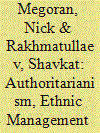

|
|
|
|
|
| Summary/Abstract |
Why was there no ethnicity-based violence in Uzbekistan in June 2010? That month there was widespread violence against ethnically Uzbek citizens of southern Kyrgyzstan. Although its occurrence might have been expected, there was no retaliation against the sizeable Kyrgyz minority of Uzbekistan. Following an overview of the relatively sparse research on this minority, the essay explores how authoritarian conflict management by the Uzbek government reanimated ‘people’s friendship’ discourses, preventing both active mobilisation and the demonisation of a minority. It concludes with some reflections on the prospects for the future of ethnic minorities in Central Asia’s nationalising republics.
|
|
|
|
|
|
|
|
|
|
|
|
|
|
|
|
| 2 |
ID:
105447


|
|
|
|
|
| Publication |
2011.
|
| Summary/Abstract |
Western geopolitical discourse misrepresents and constructs Central Asia as an inherently and essentially dangerous place. This pervasive 'discourse of danger' obscures knowledge of the region, deforms scholarship and, because it has policy implications, actually endangers Central Asia. This article identifies how the region is made knowable to a US-UK audience through three mutually reinforcing dimensions of endangerment: Central Asia as obscure, oriental, and fractious. This is evidenced in the writings of conflict resolution and security analysts, the practices of governments, the activities of international aid agencies and numerous lurid films, documentaries and novels. The article first establishes the tradition of inscribing danger to Central Asia, in both academic and policy discourse, from the colonial experience of the nineteenth century through to the post-Soviet transition and subsequent considerations of the region in terms of the war on terror. It considers several examples of this discourse of danger including the popular US TV drama about presidential politics, The West Wing, the policy texts of 'Washingtonian security analysis' and accounts of danger, insecurity and urban violence in the Ferghana Valley. It is argued that popular policy and academic texts are relatively consistent across the three dimensions of endangerment. This argument is demonstrated through a discussion of how policy-making and practice is informed by this discourse of danger and of how the discourse of danger is contested within the region. The example of urban violence in Osh, Kyrgyzstan and Jalalabad, Afghanistan in 2010 demonstrates how opportunities to mitigate conflict may have been lost due to the distortions of this discourse of danger. It concludes by raising the challenge to policy-makers, journalists and academics to contest this western geopolitical discourse and provide better accounts of how danger is experienced by Central Asians.
|
|
|
|
|
|
|
|
|
|
|
|
|
|
|
|
| 3 |
ID:
118760
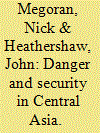

|
|
|
| 4 |
ID:
101734


|
|
|
|
|
| Publication |
2011.
|
| Summary/Abstract |
Critical international relations theory has given too little attention to regionally specific manifestations of discourses of the 'war on terror'. Using Richard Devetak's concept of a 'gothic scene of international relations', this article considers the final months of the regime of Kyrgyzstan's former President, Askar Akaev. Akaev evoked a gothic fantasy of a gloomy Kyrgyzstan terrorised by monsters recognisable from President Bush's nightmares, peculiarly Kyrgyz monsters, and obscene hybrids. That America was portrayed as a monster by an undemocratic regime fighting a desperate rearguard action highlights ironies both in Devetak's theory and in the international relations of Central Asia. We therefore suggest that attention needs to be paid to a gothic geography of international relations.
|
|
|
|
|
|
|
|
|
|
|
|
|
|
|
|
| 5 |
ID:
083596
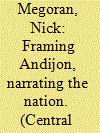

|
|
|
|
|
| Publication |
2008.
|
| Summary/Abstract |
Tashkent's handling of anti-government protests and violence in the city of Andijon on 13 May 2005 has generated enormous controversy and had significant political repercussions. However, there has been no detailed analysis of rival interpretations of what happened. This paper begins to redress this lacuna by analysing a book on the subject authored by the President of Uzbekistan, Islam Karimov. Using framing theory, it identifies four key themes deployed in the narrative to delegitimize the government's opponents: terrorism and criminality; inauthentic Uzbekness and deviant masculinity/religiosity; constitutional illegitimacy; and the subversion of the scientific laws of states. Significantly for an understanding of regime legitimization and nationalism in Uzbekistan, no recourse is made to the government's intellectual framework known as the 'ideology of national independence'. The paper points to the need for further research to enable scholars to develop a deeper and more nuanced understanding of the contemporary politicization of national belonging in independent Uzbekistan
|
|
|
|
|
|
|
|
|
|
|
|
|
|
|
|
| 6 |
ID:
075094


|
|
|
|
|
| Publication |
2006.
|
| Summary/Abstract |
Political geographers have been surprisingly slow to engage with the importance of religion in contemporary international relations. Informed by theories of critical geopolitics, this paper addresses this failure by considering the Church of England's immediate response to the Al-Qaeda attacks in the USA on 11 September 2001. Focusing on a national service of remembrance held at St. Paul's Cathedral on September 14, it argues that the service was both an expression of grief at a shocking tragedy, and a (geo)political commentary. Occurring at a crucial moment of public debate about how to understand and respond to '9/11', the service scripted a geopolitical text that resonated with voices that were advocating a military response. The article undertakes a discursive reading of the service and its coverage by journalists, and uses interviews with key organisers to analyse its production. It concludes that although the organisers of the service strove to create what they considered to be an apolitical event, the service became part of a process of geopolitical scripting that made the invasions of Afghanistan and Iraq more likely, and alternative peaceful responses to the crisis of 9/11 less likely. It calls on the Church of England to reconsider this aspect of its engagement with international affairs, by listening to non-Western Anglican perspectives, and political geographers to interrogate more systematically the intersections of religion and the 'war on terror'.
|
|
|
|
|
|
|
|
|
|
|
|
|
|
|
|
| 7 |
ID:
065364


|
|
|
| 8 |
ID:
084638
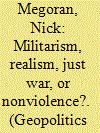

|
|
|
|
|
| Publication |
2008.
|
| Summary/Abstract |
Despite illuminating multiple modalities by which armed conflict is discursively justified, critical geopolitics can be criticised for providing a weak normative engagement with the social institution and practices of warfare. This has limited the impact of this school of thought outside of geography and critical security studies at a time when the ethics of military intervention have been prominent in public debate. This article explores the moral discourse of critical geopolitics through an examination of Gerard Toal's writings on Iraq and Bosnia. This scholarship is reviewed in the light of Coates's typology of major traditions of moral reflection on war - militarism, realism, just war theory, and pacifism/nonviolence. This analysis interrogates Toal's narratives, in which American military intervention was advocated in the Former Yugoslavia and opposed in Iraq. This suggests that rather than a thoroughgoing commitment to pacifism/nonviolence, or a blanket cynicism about American foreign policy, Toal's thinking includes an underlying attachment to some form of just war reasoning. However, its implicit and partial appropriation leads to a certain incoherence and selectivity that calls for further reflection. This presents a challenge to critical geopolitics. If it chooses to engage more explicitly with just war theory, its insights into identity and militarism could in turn inform a reworking of aspects of the theory, thereby facilitating critical geopolitics' engagement with wider public anti-militaristic modes of discourse. However, as this risks blunting the political potential of the project and repeating the mistakes of twentieth-century geopolitical thought, the paper concludes with a call for a wholehearted commitment to nonviolence.
|
|
|
|
|
|
|
|
|
|
|
|
|
|
|
|
| 9 |
ID:
077246
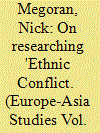

|
|
|
|
|
| Publication |
2007.
|
| Summary/Abstract |
Providing a critique of alarmist discussions of the danger of ethnic conflict in Kyrgyzstan, and the positivist epistemological assumptions and research practices that underpin them, this article develops an approach to researching 'ethnicity' and 'ethnic conflict' through the use of focus groups. Uzbeks and Kyrgyz in southern Kyrgyzstan expressed similar views about the closures of international boundaries, framed in terms of ethnicity. However, this was not an essentialist notion, but rather a concept of authentic 'Uzbekness' or 'Kyrgyzness' predicated primarily on the performance of endogenous kinship practices and Muslim/Soviet notions of class morality, nuanced by geography. These overlaps and discrepancies provide resources for those wishing to articulate visions of future social formations wider than the range of options currently propagated by ethnic entrepreneurs.
|
|
|
|
|
|
|
|
|
|
|
|
|
|
|
|
| 10 |
ID:
067321
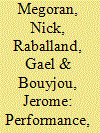

|
|
|
| 11 |
ID:
065372


|
|
|
| 12 |
ID:
061407


|
|
|
| 13 |
ID:
065842


|
|
|
|
|
|
|
|